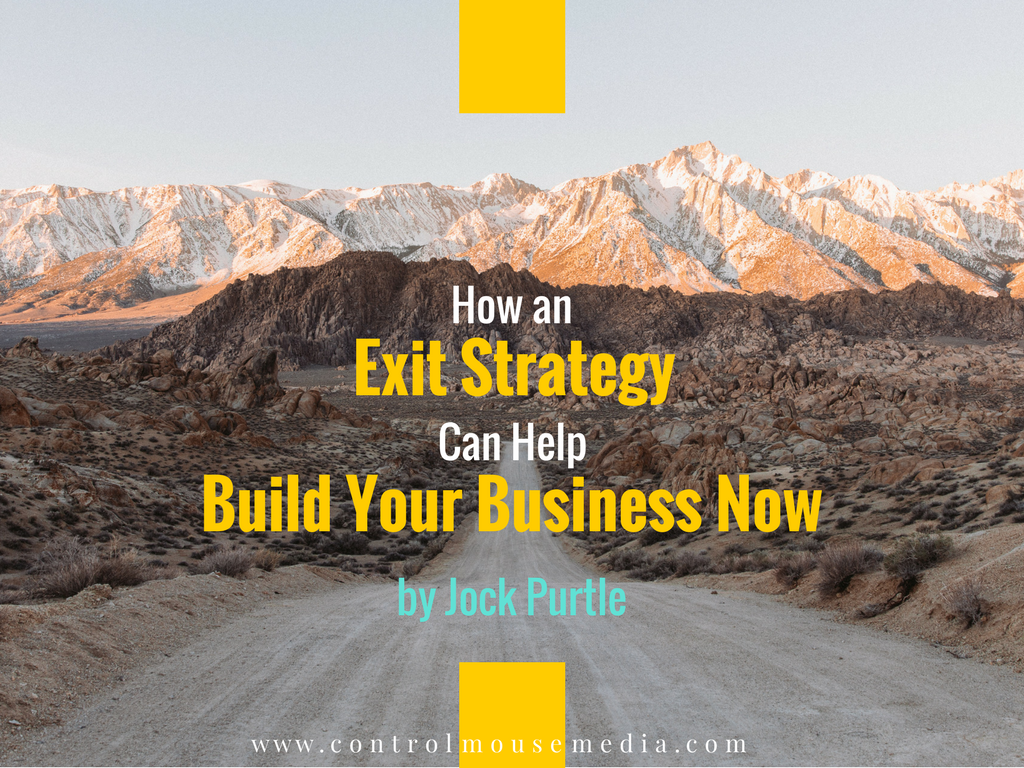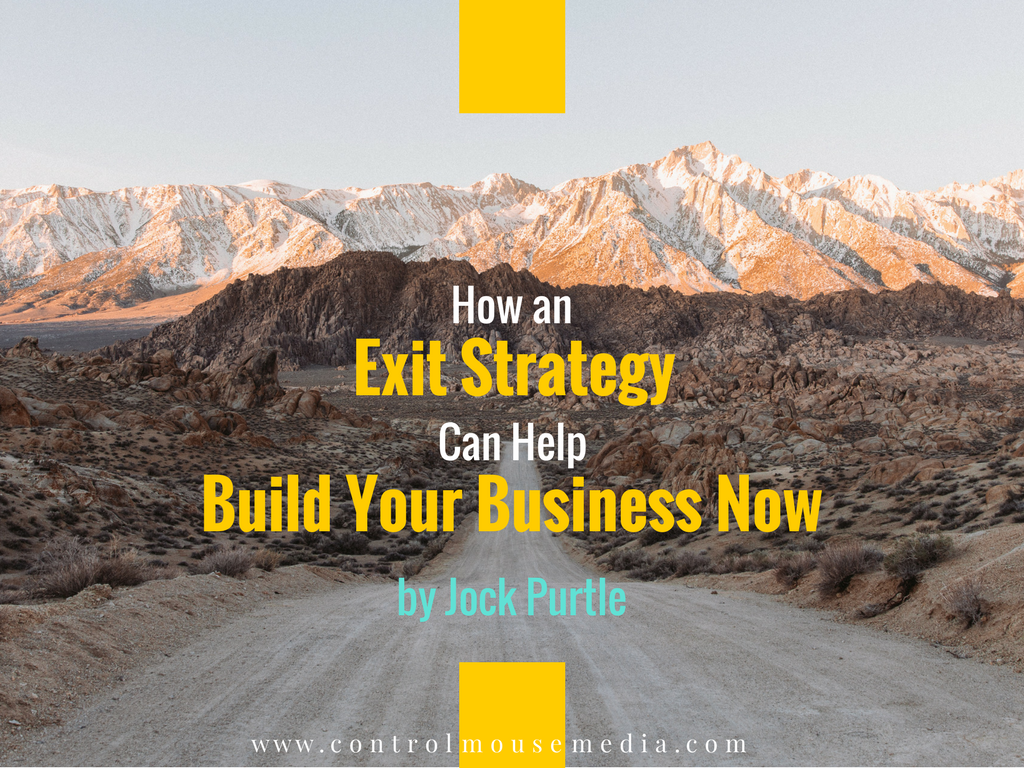Note from the Editor, Michael Boezi:
Content strategy is not just about building an audience – it’s also about managing your intellectual property assets as a business. So, what happens if you ever sell the business? Is everything in good order – including your content assets? Do you have clear ownership of the rights, or are there any potential ambiguities?
This is why it helps to think in terms of an exit – even if your company is still in its early stages. You want to be prepared for such an event, sure – but also, sound asset management serves the business at any point in a company’s lifecycle.
Yes, we’re all busy serving our customers and growing our businesses. But if you don’t pay attention to this now, it could easily get away from you. This is why I invited Jock Purtle to write a guest post on the topic. Jock is an expert on valuations and brokering the purchase and sales of high-growth, online businesses.
In this post, Jock lays out how an exit strategy is not just about the future – it can actually help your business today.
How an Exit Strategy Can Help Build Your Business Now
by Jock Purtle, CEO and Founder of Digital Exits, LLC

Whenever I talk to business owners about putting an exit strategy in place, they automatically respond by telling me there isn’t really anything to sell (yet) or the fact that their business isn’t currently for sale.
What they fail to think about, though, is that an exit strategy is more than just a way for an investor to buy the business from you. Having one can help you build and grow a business that’s great for you to own right now.
To understand this, think about what your business looks like to a potential investor.
| A good business has: | A good business to buy has: |
|---|---|
| Consistent earnings | Consistent earnings |
| Minimal risks | Minimal risks |
| Easy ownership traits | Easy ownership traits |
| Good growth potential | Good growth potential |
| Clear financials | Clear financials |
See the similarities?
If a business is a good target for someone to buy, it typically means that the business is good to own – which is great for the current owner. This helps you figure out the trajectory of your business and help you make the decisions needed as you begin growing.
You can focus your energy on the areas that are going to make the business more valuable and therefore attractive to investors, and benefit from those efforts yourself.
How An Exit Strategy Gives You Increased Flexibility
To help you understand this, let me show you a story about a client who approached me a few years ago.
I was contacted by a client who owned an eCommerce business that sold sporting goods direct to consumers, and supplemented their income by selling to schools and local municipalities. The business was great to own, fairly automated, and had seen consistent growth for the last few years.
Like so many other entrepreneurs, though, this client wasn’t happy with his results. He wanted more. After seeing so much success with his first business, he wanted bigger and better. His new business venture started attracting private investors who were willing to financially commit to helping him grow the business, on one strict condition – he had to invest his own money into it first.
The client didn’t have the funds available, though. He had to reach out to a bank for assistance, but the bank wasn’t willing to give him the money he needed unless he sold his eCommerce business first. Thankfully, he built the business around making an exit one day, which gave him the flexibility he needed to move into the new opportunity. He sold his first business, and raised the capital his investors wanted to see so they could move forward.
This client and his story relates to so many other entrepreneurs, because most people simply don’t think they’ll ever sell their business before a real need presents itself. This client is the exception to that rule, though, because he had an exit strategy and was ready to go.
I see this happen a lot. Over the past year, numerous people have come to me wanting to sell their business, with me recommending that they wait at least 6 to 18 months to sell while they address certain factors that investors are going to be picking apart. By waiting longer to sell the business, they’re able to increase the value of the business and their chances of actually getting it sold.
The reasons they want to sell now are varied, but the most common reasons I see are:
- They’re burned out and tired of the business.
- They have uncovered a new idea they want to pursue.
- They’re dealing with big life changes.
- They can no longer agree with their business partner.
- The business has begun to trend downwards.
Time plays a major role in each of these reasons. If you talked to the owners and asked them if they thought about selling a couple years beforehand, they would tell you that you were crazy.
How To Build An Exit Strategy For Your Business
Putting together the right plan of attack can be difficult to do, because every business is different and everyone’s personal goals are different.
That being said, you can start putting together your exit strategy and therefore, your growth strategy, by focusing on the 4 key areas that investors are going to look at:
- Minimizing your risks. If there are risks in your business that you know about, you need to address them before you list the business for sale. Investors will find them and will either back out of the deal, or use those risks to significantly lower your asking price.
- Identifying how you can grow. Investors will want to see that your business hasn’t been completely tapped out, and that there is room to grow after they acquire the business from you. To help justify your asking price, start identifying growth areas and create strategies for your investor to capitalize on them after the sale.
- Making the business easy to transfer. Your business shouldn’t revolve completely around you. If it does, it’s going to be hard to transfer to your investor. That means you need to start working yourself out of the business, automating what you can, and putting in new people to take care of tasks after you’re gone.
- Ensuring your claims can be verified. It’s shocking how many business owners try to get the highest asking price possible while providing unclear and sometimes inaccurate financial statements. Make sure your claims can be easily verified, and that your financials are clean and detailed.
As long as you focus on implementing each of these four areas into your exit strategy, getting the business sold if the opportunity ever presents itself, or you come across a situation where you need to sell fast will be a lot easier to do.
In the end, you’re going to build a business that’s not only easy to sell, but also easy and profitable for you to own.
[avatar id=”116″] Written by
About the author: Jock Purtle is the CEO and Founder of DigitalExits.com, a business brokerage. He works with digital business owners to expand, sell and increase the value of the businesses they work so hard to build.

Leave a Reply